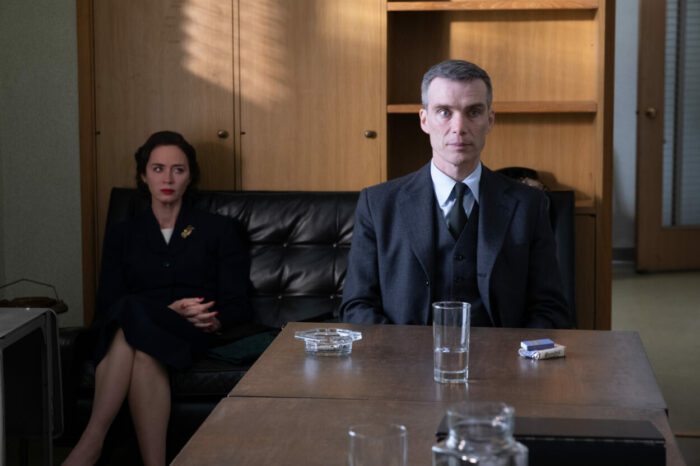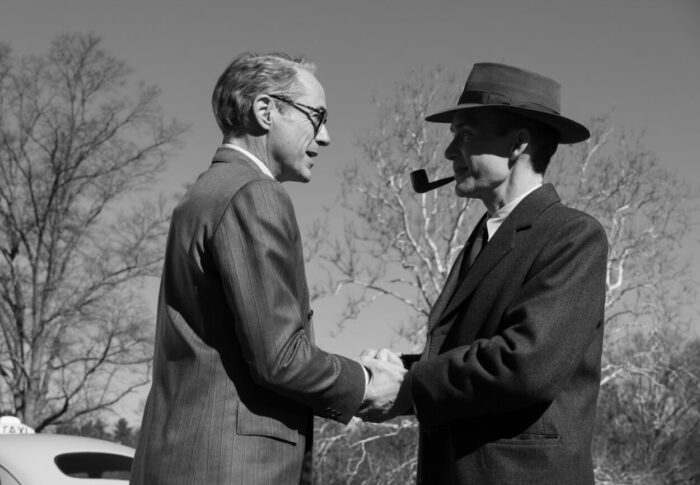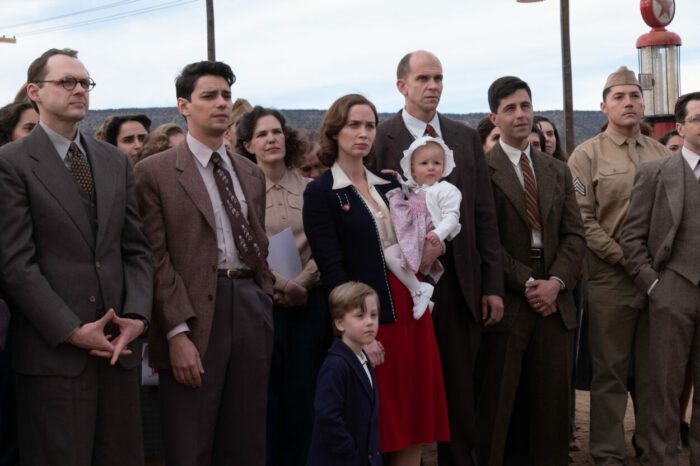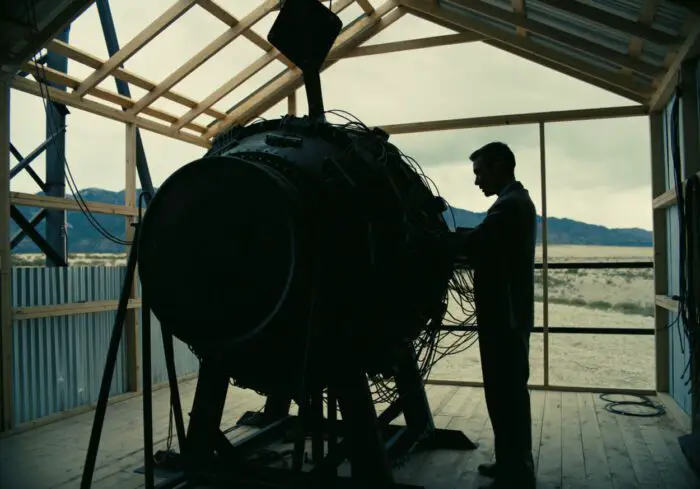This piece was written during the 2023 WGA and SAG-AFTRA strikes. Without the labor of the writers and actors currently on strike, films like Oppenheimer wouldn’t exist.
Oppenheimer is a lot like being at a party full of interesting people and getting cornered by someone who won’t stop talking about the history documentary they just saw. What starts as a captivating visual experience melding the best of cinema with storytelling soon turns into a ponderous motion picture—the most frustrating part being that elements which work spectacularly some of the time fail at others. Consequently, the moments where Oppenheimer excels exaggerate those when its quality drops.
The film is largely a biopic insofar as it’s based on historical details about Julius Robert Oppenheimer. Events unfold in a nonlinear fashion as the story jumps between different points in time. Although the gravity of specific years pulls focus, audiences encounter the man at various points in his life, everything in essence orbiting his successful development of the atomic bomb.

When it works this conceit cleverly allows audiences to experience Oppenheimer’s life in totality. The past conceptually remains present. The older man living with the consequences of his actions gives way to the youthful student unaware his thirst for knowledge leads down a dark path. In this way, Oppenheimer reflects on the ripples even as they first expand.
The trouble is that there is so much history of consequence to get through and so many individuals to meet along the way, Oppenheimer often becomes a pinball montage. Moments end, quickly cutting to the next scene as details are dumped in expository one-liners before leaping yet again. Large chunks of the narrative become hurried instances. Details arrive in a passing whirlwind obfuscating how little the film is exploring. Further into the movie, things slow—only to start dragging.
Whatever the speed, Oppenheimer touches topics in passing. This may make it seem like the movie is dealing with a lot of weighty issues, whether historical, philosophical, moral, etc., but anything mentioned feels abbreviated. Gradually, the film begins to feel less like a maximum-efficiency motion picture and more like moviemakers cramming as much as they can into the 180-minute runtime. It’s a classic failing of quantity over quality.

What makes this worse is the painfully unnatural dialogue at times. Some exchanges in Oppenheimer are fabulous. They have humor and humanity. However, there are some seriously eyeroll-inducing lines that feel like pretentious people trying to be eternally quotable. It also gets old early on how often people refer to Oppenheimer as a genius. One almost gets the impression writer-director Christopher Nolan was worried audiences might forget, so every third scene someone mentions it again.
Visually, Oppenheimer opens strong. There’s a downright poetic blend of imagery which calls to mind directors like Andrei Tarkovsky. This thrilling use of cinematic techniques, however, is soon set aside. Occasionally, deeper visual storytelling resurfaces with surreal moments and similar poetics, but it stops feeling like a consistent part of the film. Rather, cinematic flair becomes an infrequent attempt to rouse a presumably bored audience after prolonged dry portions. Additionally, they can feel rankly amateurish, such as when two characters are bare naked bearing their souls.
The score composed by Ludwig Göransson falls into a similar trap. Sometimes the music augments events on screen. For example, violins enliven visions of subatomic particles in motion, or synthesizers add the right touch of melancholy. But the music often stumbles badly by creating a demanding tonal atmosphere insisting on a mood rather than enriching one.

The star-studded cast, particularly those with more than one or two lines per scene, does a stellar job. Cillian Murphy as Oppenheimer is astonishing in his ability to convey a sense of buried emotions. Robert Downey Jr. as Lewis Strauss is remarkably odious as his character reveals sleazy depths while we get to know him. Emily Blunt as Kitty Oppenheimer has some solid moments as does Florence Pugh as Jean Tatlock. Unfortunately, like too many Nolan movies, Oppenheimer gives women only limited facets.
Granted, in a story about so many historical events—the building of Los Alamos, the atomic bomb and its aftermath—not every individual moment can be explored in detail. Some facts must be cut. Still, considering Jean Tatlock’s battles with clinical depression and struggles with her sexuality, her being a lesbian during a time when that was treated as mental illness, Nolan’s reducing her character to tragic love interest seems like a lost opportunity. The same could be said of Kitty Oppenheimer’s repeated car accidents and broken bones stemming from recklessness and alcoholism.
From a technical standpoint, Oppenheimer is a winner. There’s no way to deny it looks great. I’m certain many will overlook other flaws high atop the rampart of image ratios. Yet, that’s like ignoring sour notes on a guitar because it’s got the right pickups. Regardless of the degree technical gimmicks like image ratios, practical effects, and IMAX enhance a viewing, Oppenheimer stumbles because of narrative problems.

The story being told is oddly too rushed at the start then slows to a crawl when it shifts focus into a drama about destroying reputations through politics. In essence, making the whole movie largely a tale about reputations. To top it off, Oppenheimer suffers from a Nolan film’s tendency towards abrupt choppy edits. Characters expressing a great deal simply through facial expressions tend to get cut off one second into emoting. At times, however, Oppenheimer becomes truly brilliant. The problem is Christopher Nolan wants to craft a film about history, politics, morality, nuclear weapons, modernism, post-modernism, war, quantum mechanics, nature, and humanity.
The result is a bloated, pretentious movie insisting it’s about important topics without any genuine exploration of them. Cliff-Notes historical outlines meld with implications of heavy moral questions into a motion picture that so badly wants to be an atomic blast it can’t see how it’s just a firework. Brilliant at times, the spectacle quickly fades revealing an empty sky. Some stellar performances from stars help Oppenheimer shine. However, they can only add so much to a flawed film which is not the masterpiece it wants to be.




Nicely done, Jay!
Thank you kindly!